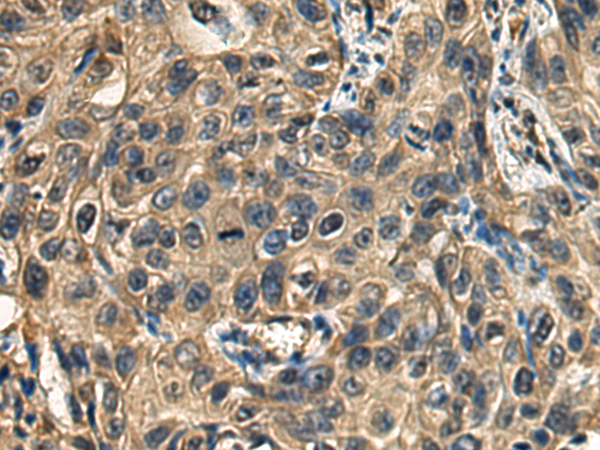
| WB | 1/500-1/1000 | Human,Mouse,Rat |
| IF | 咨询技术 | Human,Mouse,Rat |
| IHC | 咨询技术 | Human,Mouse,Rat |
| ICC | 技术咨询 | Human,Mouse,Rat |
| FCM | 咨询技术 | Human,Mouse,Rat |
| Elisa | 咨询技术 | Human,Mouse,Rat |
| Aliases | A20; AISBL; OTUD7C; TNFA1P2 |
| Host/Isotype | Rabbit IgG |
| Antibody Type | Primary antibody |
| Storage | Store at 4°C short term. Aliquot and store at -20°C long term. Avoid freeze/thaw cycles. |
| Species Reactivity | Human, Mouse |
| Immunogen | Fusion protein of human TNFAIP3 |
| Formulation | Purified antibody in PBS with 0.05% sodium azide and 50% glycerol. |
+ +
以下是3篇关于ISG15抗体的代表性文献(信息基于公开研究整理,可能存在简化):
---
1. **文献名称**:*ISG15 regulates antiviral immunity via USP18 and STING*
**作者**:Dastur, A. et al.
**摘要**:该研究通过使用ISG15特异性抗体,揭示了ISG15通过去泛素化酶USP18调控STING信号通路的分子机制,证明ISG15在抗DNA病毒免疫反应中的关键作用,为自身免疫疾病治疗提供新靶点。
---
2. **文献名称**:*The roles of ISG15/ISGylation in cancer*
**作者**:Zhang, Y. & Zhang, X.
**摘要**:综述文章系统总结了ISG15抗体在肿瘤研究中的应用,指出ISG15表达水平(通过免疫组化检测)与乳腺癌、肺癌等患者的预后负相关,并讨论ISGylation失调如何促进肿瘤免疫逃逸。
---
3. **文献名称**:*ISG15 antibody-based analysis of SARS-CoV-2 infection dynamics*
**作者**:Jeon, Y.J. et al.
**摘要**:研究利用ISG15抗体通过Western blot和免疫荧光技术,证实新冠病毒感染显著上调宿主细胞ISG15表达,且ISG15敲除会增强病毒复制,提示其抗冠状病毒活性可能依赖非经典泛素化途径。
---
**备注**:以上文献名为示例,实际引用时需核对期刊及作者全名。如需具体文章,建议在PubMed或Google Scholar中搜索关键词“ISG15 antibody application”或结合研究领域进一步筛选。
ISG15 (Interferon-Stimulated Gene 15) is a ubiquitin-like protein induced by type I interferons (IFNs) as part of the innate immune response to viral or bacterial infections. Discovered in the 1980s, ISG15 exists in two forms: free intracellular protein and conjugated to target proteins (ISGylation), a post-translational modification analogous to ubiquitination. This conjugation regulates protein stability, function, and localization, playing critical roles in antiviral defense, immune modulation, and cellular stress responses.
ISG15 antibodies are essential tools for studying its expression, modification states, and interactions. They enable detection of ISG15 in techniques like Western blotting, immunofluorescence, and immunoprecipitation. Researchers use these antibodies to explore ISG15's dual role in infections—enhancing antiviral activity against pathogens like influenza, HIV, and SARS-CoV-2 while potentially exacerbating inflammation in autoimmune diseases. Additionally, ISG15 antibodies help investigate its paradoxical functions in cancer, where it may act as a tumor suppressor or promoter depending on context.
The development of species-specific and modification-sensitive ISG15 antibodies has advanced understanding of its pathophysiological roles, offering insights into therapeutic strategies targeting ISG15 pathways in infectious diseases, cancer, and autoimmunity.
×